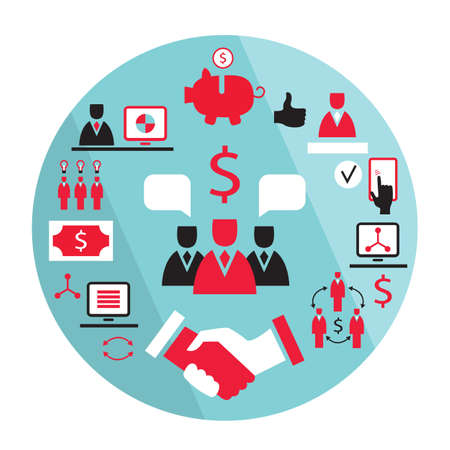1. SBA Loans Are Only for Struggling Businesses
One of the most common myths about Small Business Administration (SBA) loans is that they are only available to businesses that are struggling financially or on the verge of closing their doors. In reality, this couldn’t be further from the truth. SBA loans are designed to support a wide range of small business needs, not just emergencies or crisis situations.
Who Really Uses SBA Loans?
SBA loans are used by all kinds of businesses—from startups to established companies that are doing well. Many thriving small businesses apply for these loans to fuel growth, expand operations, buy new equipment, or even acquire another business. Here’s a quick comparison to show who benefits from SBA loans:
| Myth | Reality |
|---|---|
| Only failing businesses get SBA loans | Successful businesses use SBA loans for growth and expansion |
| SBA loans are last-resort financing | SBA loans offer favorable terms for qualified businesses in various situations |
Why Successful Businesses Choose SBA Loans
The main reasons healthy and growing businesses choose SBA loans include:
- Lower down payments: SBA loans often require less money upfront compared to traditional bank loans.
- Longer repayment terms: This means smaller monthly payments and easier cash flow management.
- Flexible uses: Funds can be used for working capital, purchasing inventory, refinancing debt, or expanding locations.
- Easier qualification: The government guarantee helps more businesses get approved even if they don’t meet every bank requirement.
Key Takeaway
If your business is growing and you’re considering ways to fund your next step, don’t overlook SBA loans just because things are going well. They aren’t just a safety net—they’re also a smart tool for taking your business to the next level.
2. Getting Approved Is Impossible Without Perfect Credit
One of the most common myths about SBA and bank loans is that you need a flawless credit score to even stand a chance. Many small business owners shy away from applying because they think anything less than perfect credit will lead to an automatic rejection. But the reality is, lenders look at much more than just your credit score.
How Lenders Really Assess Your Application
Lenders use a holistic approach when reviewing SBA and bank loan applications. While your credit history is important, it’s only one part of the bigger picture. Here are some key factors lenders consider:
| Factor | What It Means for You |
|---|---|
| Personal Credit Score | Lenders want to see responsible financial behavior, but minor issues or past mistakes won’t always disqualify you. |
| Business Financials | Your business’s cash flow, revenue, and profitability show if you can handle repayment. |
| Collateral | Assets like equipment or property can help secure your loan, making approval easier even with average credit. |
| Business Plan | A solid plan demonstrates how you’ll use the loan and how it will help your business grow. |
| Industry Experience | Your background in your field reassures lenders that you know what it takes to succeed. |
| Debt-to-Income Ratio | Lenders check how much debt you have compared to your income to make sure you can manage another loan. |
You Don’t Have to Be Perfect—Just Prepared
If your credit isn’t spotless, don’t count yourself out. Being honest about any past bumps in the road and showing strong business fundamentals goes a long way. Lenders understand life happens—they’re looking for applicants who are ready and able to move their businesses forward, not just those with perfect scores.

3. SBA Loans Take Forever and Are Too Complicated
One of the most common myths about SBA and bank loans for small businesses is that getting an SBA loan takes forever and the process is just too complicated for most entrepreneurs to handle. While it’s true that there are several steps involved, the reality is much less intimidating than you might think.
How Long Does It Really Take?
Many people believe that applying for an SBA loan means waiting months just to hear back. In fact, recent improvements in technology and streamlined processes at both banks and the SBA have made the timeline much faster. Here’s a quick look at typical timeframes:
| Loan Type | Typical Processing Time |
|---|---|
| SBA Express Loan | 36 hours for approval decision |
| SBA 7(a) Standard Loan | 5-10 business days (approval after all documents are submitted) |
| Traditional Bank Loan | 1-4 weeks |
You can see that, in some cases, an SBA loan can actually be processed as quickly as a traditional bank loan—especially if you have your paperwork ready to go.
The Application Process: Easier Than You Think
There’s also a myth that the paperwork for an SBA loan is endless. The truth is, while you do need to provide some financial information, most lenders offer clear checklists and even online portals to help guide you through each step. Many banks have dedicated teams whose job is to walk small business owners through the process from start to finish.
What You’ll Need:
- Basic business information (like your EIN and business address)
- Your business plan or description of how you’ll use the funds
- Financial statements (such as tax returns and balance sheets)
- Personal identification and credit history
If you’re organized with your documents, the process can move along pretty smoothly. And remember, lenders want to help—you’re not on your own!
Busting the Myth: It’s Not Just for Big Businesses with Accounting Teams
You don’t need a team of accountants or lawyers to apply for an SBA loan. Most successful applicants are everyday small business owners who followed instructions and reached out when they had questions. There are also free resources available through organizations like SCORE or Small Business Development Centers (SBDCs), which can help you prepare your application and avoid common pitfalls.
4. You Need to Provide Collateral for Every Loan
Many small business owners worry that they must put up collateral—like their house, car, or business assets—to qualify for every SBA or bank loan. This is a common myth and can discourage entrepreneurs from applying for the funding they need. Let’s clear things up: not every loan requires collateral, and there are actually several options available.
Understanding Collateral Requirements
Banks and the SBA do use collateral as a way to reduce their risk. However, it’s not an automatic requirement for all loans. The type of loan, your credit profile, and the lender’s policies all play a role in what is needed.
Types of Loans and Collateral
| Loan Type | Collateral Needed? | Typical Examples |
|---|---|---|
| SBA 7(a) Loan | Sometimes | Real estate, equipment; but lack of collateral does not mean automatic denial if other factors are strong. |
| SBA Microloan | Not Always | Flexible; may accept personal guarantee or no collateral for smaller amounts. |
| Traditional Bank Term Loan | Usually | Business assets, inventory, property. |
| Unsecured Business Line of Credit | No | No specific asset required; based on creditworthiness. |
| Business Credit Card | No | No collateral; approval depends on credit score. |
Options Beyond Traditional Collateral
- Unsecured Loans: These loans don’t require you to pledge business or personal assets. Approval is usually based on your credit score, business revenue, and overall financial health.
- Personal Guarantees: Sometimes, lenders might ask you to sign a personal guarantee instead of providing physical collateral. This means you agree to pay back the loan personally if your business can’t.
- Alternative Lenders: Online lenders and fintech companies often offer unsecured loans or cash advances with flexible requirements—but be sure to check interest rates and terms closely.
- SBA Flexibility: Even if you don’t have enough collateral, the SBA encourages lenders to consider your application based on repayment ability and business strength rather than just available assets.
The Bottom Line: Don’t Assume You’re Out of Options!
If you’ve been holding off on applying for a loan because you don’t have valuable collateral, it’s worth speaking with lenders about your situation. There are many financing options designed specifically for small businesses without major assets. Always ask questions and shop around for the best fit for your needs.
5. Banks Dont Really Want to Lend to Small Businesses
Busting the Myth: Do Banks Really Avoid Small Business Loans?
A common belief among entrepreneurs is that banks arent interested in helping small businesses. Many think that unless you already have a big, successful company or lots of collateral, traditional banks will turn you away. But is this really true? Lets break down why banks actually do want to lend to small businesses and what motivates them to work with local entrepreneurs.
Why Banks Care About Small Business Lending
Banks play a huge role in supporting local communities and economies. When they lend to small businesses, theyre not just taking a risk—theyre investing in their own neighborhoods. Here are some reasons why banks are interested in funding small business growth:
| Reason | How It Benefits the Bank |
|---|---|
| Community Relationships | Banks build trust and loyalty by helping local businesses succeed, leading to more customers and long-term partnerships. |
| Diversified Loan Portfolio | Lending to various businesses spreads out risk instead of putting all their eggs in one basket. |
| Regulatory Incentives | Banks often receive credit from regulators for lending to small and underserved businesses through programs like CRA (Community Reinvestment Act). |
| Business Growth Opportunities | When a small business grows, it often needs more banking services—like checking accounts, credit cards, payroll, and merchant services—which means more business for the bank. |
SBA Loans: A Win-Win Solution
The Small Business Administration (SBA) works with banks to make lending less risky. With SBA-backed loans, the government guarantees part of the loan amount, so banks feel more comfortable approving funding for new or growing businesses—even those without perfect credit or large assets.
What Does This Mean for Entrepreneurs?
If youre starting or expanding a business, dont assume banks will turn you down. Many lenders have dedicated teams focused on small business customers, and there are multiple loan programs designed just for you. The key is being prepared: have your business plan, financials, and documents ready before you apply. Remember, banks want your business to succeed—it’s good for both you and them!

